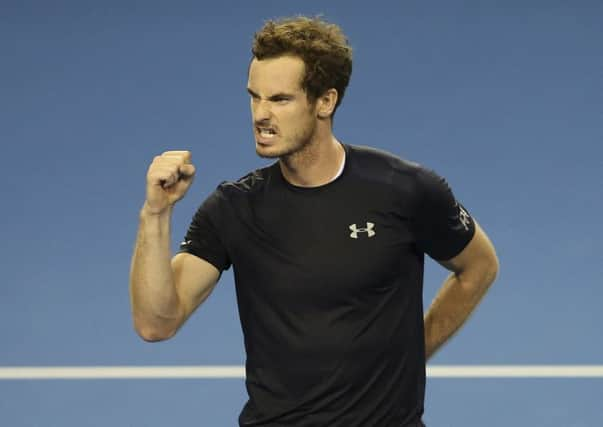GB all square after Andy Murray’s winning start


Dan Evans got a hit from the Glasgow crowd, exceeding expectations by taking a set off Bernard Tomic on the way to a spirited 6-3, 7-6 (2), 6-7(4), 6-4 defeat in the Davis Cup semi-final with Australia.
So while the gamble did not quite pay off, it was made to look a very reasonable shout by Leon Smith, the Great Britain captain. Evans made Tomic work harder than anyone, save for possibly Smith, expected.
Advertisement
Hide AdAdvertisement
Hide AdBut what is not surprising is that Britain’s hopes of reaching a first Davis Cup final since 1978 are likely to hinge on Murray, both in the doubles today alongside brother Jamie and again tomorrow in the reverse singles against a weary Tomic.
The suspicion that the unpredictable Evans might be inspired to play the high-level tennis he is capable of was borne out. But while he took Tomic to four sets, his heroics failed to prevent Australia levelling the score at 1-1 after the first day of battle.
Murray, the main attraction for the boisterous, sold-out crowd in Glasgow, had earlier made a mockery of those hopeful noises emanating from the Australia camp suggesting he might wilt under the pressure.
The world No 3 swept his young friend Thanasi Kokkinakis aside in straight sets, 6-3, 6-0, 6-3. “He killed me,” was how the 19-year-old, sometimes referred to as “cocky Kokkinakis”, summed it up afterwards.
“I haven’t lost six-love for a long time, it’s not good for the ego.”
Evans, to his enormous credit, was inspired by Murray’s ruthless disposal of Kokkinakis rather than intimidated. The world No 300, originally scheduled to play in a Challenger event in Istanbul this week, recovered from a first set in which he betrayed understandable evidence of nerves to take Tomic to a second-set tie-break.
With the Emirates Arena in ferment, he did the same again in the third set, this time securing victory 7-5, before succumbing after four sets at shortly after 6:30pm.
Smith had gone out on a limb to opt for Evans, the talented maverick whose professionalism is sometimes doubted. Evans did more than enough to merit his inclusion in favour of an out-of-form James Ward and Kyle Edmund, who was not completely fit after hurting an ankle in practice.
Advertisement
Hide AdAdvertisement
Hide AdThe crowd appreciated the efforts of the diminutive Evans, having already enjoyed a satisfyingly thumping victory for Murray.
The Scot ensured Britain got off to the best possible start. Wally Masur, the Australia captain, sat cross-legged to one side of the umpire’s chair as if watching something on TV. It was, though, a resigned-looking pose.
He knew there was little he could do about what was happening in front of him as Murray provided Kokkinakis with a tennis lesson in a match lasting just one hour and 47 minutes.
Smith’s repose, arm slung on back of chair, legs splayed, conveyed the impression of someone enjoying the show.
Murray hailed the “obviously fantastic crowd” afterwards, asking them to afford Evans the same level of backing, which they did – and then some.
“It is different being part of a team and representing your country,” Murray said, on a day lent extra significance given that it fell exactly a year after the referendum vote. Murray entered that debate via Twitter shortly before the vote last year but has studiously refused to answer any questions on how he feels on the subject a year later.
It was, of course, coincidence that he should be leading the Great Britain effort on the first anniversary, in the east end of Glasgow of all places. Both saltires and union flags were in evidence, though the latter were far more numerous in number and were also draped around the court by the organisers, whose tight attention to protocol ensured both anthems were played before the first singles match.
Possibly in an effort to avoid some Corbyn-esque controversy, all the British players were of a mind not to sing the words to God Save the Queen. This tactic – if that is what it was – certainly ensured no individual could be singled out for non-participation. They were all very much “in the zone”, even those who knew they were restricted to only supporting roles yesterday.
Advertisement
Hide AdAdvertisement
Hide AdOnce the anthem minefield was out of the way, we could sit back and enjoy the tennis. And enjoy it the home supporters did. “Can you hear the Aussies sing?” “Oh, when the Brits go marching in.” Many old terrace favourites, doctored for tennis purposes, were all given airings after each point. Songs that haven’t been heard at a football ground in more than 30 years form the basis of the tennis songbook, it seems.
Indeed, the supporters – including a sizeable contingent from Stirling University– soon had reason to resurrect the chant “here we go, here we go, here we go” as Murray quickly asserted himself.
“Obviously it gives you a lift,” he said later. “It’s a big occasion and to have the support behind you makes a huge difference. I mean, I don’t know what that is, but it’s the case in every single sport, in my opinion.”
Murray was tickled to learn that many of the most boisterous elements of the crowd, the self-styled “Barmy Army”, had reported to the velodrome next door at 10am, three hours before the scheduled start, to warm up.
“They’ve been a great support for many years, back to when we played at Braehead,” he said. “It seems to be the same bunch of people since then and they’ve been a great help.”
They will be back today. It also seems certain Andy Murray will return as Britain seek what could prove the crucial point.